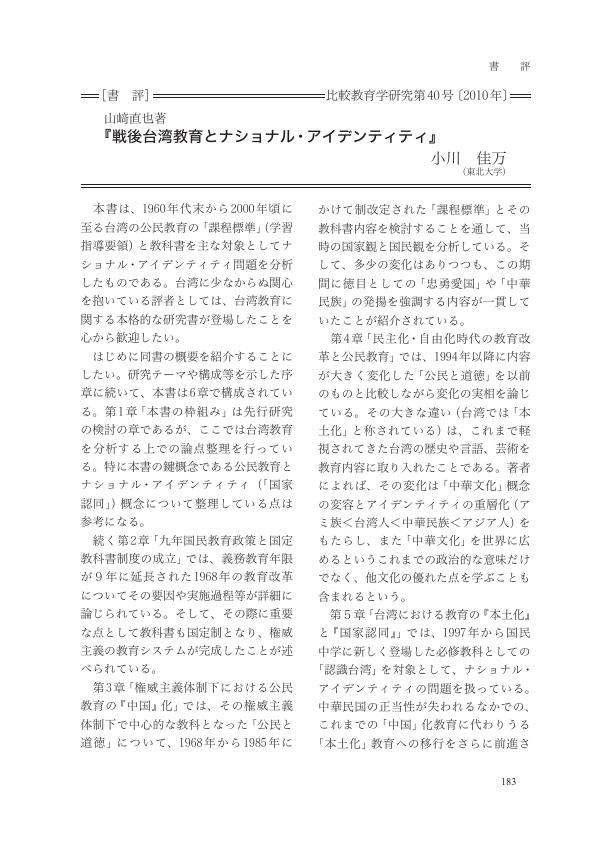7 0 0 0 OA 中国の学校教育における少数民族言語の位相 : 涼山イ族自治州のケースから
- 著者
- 小川 佳万
- 出版者
- 日本カリキュラム学会
- 雑誌
- カリキュラム研究 (ISSN:0918354X)
- 巻号頁・発行日
- vol.6, pp.101-112, 1997-03-31 (Released:2017-10-17)
This is an article discussing Yi language problems of school education in China through a case of Zhaojue county in LiangshanYi Autonomous Prefecture. This county has radically changed its position on Yi language after Cultural Revolution. Starting with introducing Yi language as a subject, primary schools adopted it as instruction language. After that secondary schools also became the same as primary schools. These years three higher educational institutions admitted to accepting students who graduated from those schools. It's true that expanding Yi language is obvious, but some people make much more of Han language. It's natural for people supporting Yi Language to insist on dealing with languages equally for "ethnic equality". It's also effective to improve educational quality. Other people support Han language as communication language and as means to success in life. Most favorable schools, so far, use Han language as instruction language and establish Yi language as a subject. Respecting minority cultures at schools in China means respecting minority languages. Han language, in fact, is respected more than Yi language. Therefore diffusing Yi language means diffusing Han language at the same time. The primary purpose of school education in China is to form what is the meaning of "Chinese" and "Chinese" are formed only by education. Han language means "Chinese" language. Yi nationality students who enter universities after having been educated in Yi language for many years need certain abilities of Han language. That's a traditional "Chinese" standard. Chinese Communist Party, however, found from its experiences that diffusing Yi language was effective to form more "Chinese". Although those changes contained not a few limitations, they have positive meaning of expanding the road for Yi nationalities to enter universities from developing areas such as Zhaojue county. They are also first attempts to realise language equality and opportunities to make "Chinese" image changed.
2 0 0 0 OA 中国における少数民族高等教育政策-「優遇」と「統制」のメカニズム-
- 著者
- 小川 佳万
- 出版者
- 日本比較教育学会
- 雑誌
- 比較教育学研究 (ISSN:09166785)
- 巻号頁・発行日
- vol.20, pp.93-104,215, 1994
2 0 0 0 OA 中国における少数民族高等教育政策
- 著者
- 小川 佳万
- 出版者
- 日本比較教育学会
- 雑誌
- 比較教育学研究 (ISSN:09166785)
- 巻号頁・発行日
- vol.1994, no.20, pp.93-104,215, 1994-07-01 (Released:2011-01-27)
- 被引用文献数
- 1
This paper deals with Chinese higher education policies for minorities focusing on the mechanisms of “preference” and “control.” The findings are as follows: First, the Chinese government established “Institutes of Nationalities”(Minzu Xueyuan) for the training of minorities' cadres. These “Institutes of Nationalities” originated with “Liberation Area-Type Colleges”, which put an emphasis on political-ideological education.Second, Chinese higher education policies for minorities are characterized as “preference.” Many of preferential policies have been instituted thus far, such as special treatments for minorities in the admission procedures and campus life of the “Institutes of Nationalities.”
1 0 0 0 OA 山﨑直也著『戦後台湾教育とナショナル・アイデンティティ』
- 著者
- 小川 佳万
- 出版者
- 日本比較教育学会
- 雑誌
- 比較教育学研究 (ISSN:09166785)
- 巻号頁・発行日
- vol.2010, no.40, pp.183-185, 2010 (Released:2023-07-19)
1 0 0 0 中国における少数民族高等教育政策
- 著者
- 小川 佳万
- 出版者
- 日本比較教育学会
- 雑誌
- 比較教育学研究 (ISSN:09166785)
- 巻号頁・発行日
- vol.1994, no.20, pp.93-104,215, 1994
- 被引用文献数
- 1
This paper deals with Chinese higher education policies for minorities focusing on the mechanisms of “preference” and “control.” The findings are as follows: First, the Chinese government established “Institutes of Nationalities”(Minzu Xueyuan) for the training of minorities' cadres. These “Institutes of Nationalities” originated with “Liberation Area-Type Colleges”, which put an emphasis on political-ideological education.<BR>Second, Chinese higher education policies for minorities are characterized as “preference.” Many of preferential policies have been instituted thus far, such as special treatments for minorities in the admission procedures and campus life of the “Institutes of Nationalities.”
1 0 0 0 成人学習施策にみる公共管理システムの転換に関する調査研究
本研究の目的は、生涯学習の推進に伴っていち早く学習機会の供給主体の多様化が進んだ成人学習の領域を対象とし、国内外の調査を通じて公共管理システムの転換の動態と課題を明らかにすることであった。おもな成果は次の通りである。1.指定管理者制度の導入は、行政と地方公共団体の出資財団との関係、行政と住民やNPOとの関係、そして財団と住民やNPOとの関係に変化をもたらしていること。この変化は、行政に対して、その守備範囲の再検討とともに、供給主体間の新たな関係設定の構築を求めるものとなっていること。2.住民ボランティアの主導で行政が支援する活気ある生涯学習事業が生まれる一方で、住民主導の事業は、事業拡大に伴い、異なるセクター間のコーディネート機能をどう確保するのかが課題となっていること。3.イギリスにおいては、伝統的に私的イニシアチブを国が追認する方式がとられてきたが、サッチャー政権以降、アウトプット評価に基づく管理が進められてきていること。4.アメリカにおいては、リテラシー教育や職業技能訓練など公的機関の責務とされているが、この領域でも民間の営利・非営利組織が参入し、契約と成果の評価に基づく管理システムが組み立てられてきていること。5.一方、日本の地方公共団体の生涯学習施策においては、学習成果の評価について問題が指摘される一方で、学習者の組織化による共同性の創出が進められていること(学会誌掲載論文)。
1 0 0 0 独創的研究拠点(COE)の形成にみる「学問風土」の研究
本研究の平成17年度の研究実績としては、昨年度から収集してきた内外の高等教育に関する文献・論文のほか、研究体制の組織・風土・制度化に関する基本的文献、東北大学の理工系学部ならびに附置研究所における研究者らの自伝・評伝・史資料などの文献・資料を、毎月1回程度のペースで研究会を開いて読み進めていった。また昨年度に行った東北大学の工学研究科、金属材料研究所、電気通信研究所など理工系の研究科・研究所における著名な研究者に対するインタビューを、中間報告の形で公表した。こうした基礎的な作業と並行して、東北大学の理工系ならびに文科系の研究科・研究所の教授・助教授を対象とした研究室体制に関する大規模なアンケート(『東北大学の研究と教育』)の集計と分析を進めた。これらの分析結果は、本研究科の年報に、「学問風土の研究-東北大学の研究と教育-」として公表(継続中)した。また、東北大学に留学して学位を取得し、その後本国に帰国して活躍しているアジア地域の著名な研究者に対して、留学当時の研究室の文化や風土についてインタビュー調査を行い、それぞれの研究室の学統を継承する子弟関係や優秀な人材を育ててきた学問風土について知見を深めた。また彼らの何人かを招聘して国際シンポジウムを開催し、学内外の研究者・大学院生らと活発な意見交換を行った。これらのインタビュー、シンポジウムでの講演ならびに質疑応答に関しては、録音テープを起こして報告書として刊行する予定である。
